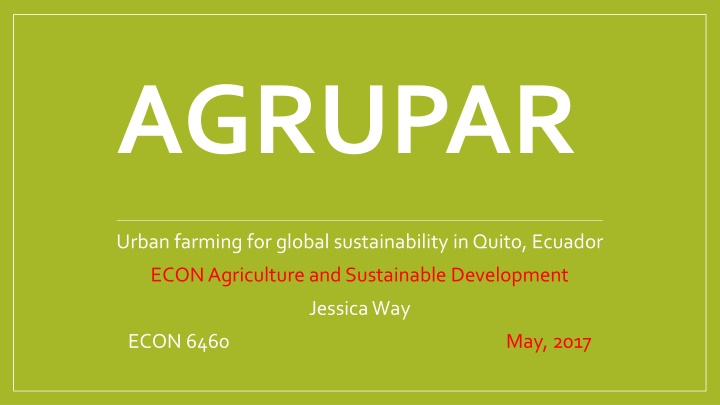
Urban Farming for Global Sustainability in Quito, Ecuador
Explore how Agrupar, a municipal initiative in Quito, Ecuador, is empowering low-income families, particularly women, through urban farming. Discover its impact on poverty alleviation, climate change resilience, and sustainable development efforts in the region.
Download Presentation

Please find below an Image/Link to download the presentation.
The content on the website is provided AS IS for your information and personal use only. It may not be sold, licensed, or shared on other websites without obtaining consent from the author. If you encounter any issues during the download, it is possible that the publisher has removed the file from their server.
You are allowed to download the files provided on this website for personal or commercial use, subject to the condition that they are used lawfully. All files are the property of their respective owners.
The content on the website is provided AS IS for your information and personal use only. It may not be sold, licensed, or shared on other websites without obtaining consent from the author.
E N D
Presentation Transcript
AGRUPAR Urban farming for global sustainability in Quito, Ecuador ECON Agriculture and Sustainable Development Jessica Way ECON 6460 May, 2017
Agrupar-the Solution Low income families in Quito spend 60-70% of income on food Created by the municipality (w/ Canadian government funding??) to promote urban farming among Quito s poorest residents Offer support in X gardens Helps families to save from $10-20 USD per month (average salary = $300) year round? what families, how is it targeted, women? Which women are targeted? Does this lift women or families out of poverty? source? Is it temporary or sustained, assets or income? conditional on what? Supplemental or full support
Benefits for farmers (who are workers, unemp, landowners tenants? Is this supplemental income? Do they receive remittances, pensions, cash transfers, how do they live? Self employed? Technical advisors teach farmers organic farming methods and techniques (government workers, volunteers?) Efficient land use for water conservation (is water a problem in this city? Source of photos?) Sponsors seeds, green house structures, and technical equipment Encourages short-cycle plants, such as lettuce and tomatoes, to replace corn and potatoes
Climate Change in Quito Most poor families live on slopes and hillsides, prone to landslides in the changing climate Droughts and heavy rains affecting water supply and topography Melting Andean glaciers changing the hydrosphere of Quito, and greatly threatening water supply Urban poor are especially vulnerable The Antisana Glacier, a primary source of water for Quito, has decreased by 23% since 1993
Women in Urban Agriculture 84% of Agrupar sbeneficiary s are women (do they have other means of support?) Women produce 50% of the worlds food by some estimates (source? See FAO paper ) In many societies women have the primary responsibility for preparing food and caring for family nutrition source? Urban farming offers an alternative economically productive activity to women, who often face challenges entering formal sector employment .. But not a livelihood?
Business Opportunities (source?) Some attempts at a revenue generating model have been made Some challenges when forced with competition of un-organic farmers in open air markets 56 productive enterprises have been created, involving 228u urban farmers (165women) Value added opportunities in the supply chain through food processing and packaging Gender ranking and reports on ECU http://reports.weforum.org/feature-demonstration/files/2016/10/ECU.pdf http://www3.weforum.org/docs/GGGR16/WEF_Global_Gender_Gap_Report_2016.pdf http://www.sciencedirect.com/science/article/pii/S0277953611001481 https://www.researchgate.net/profile/Lia_Fernald/publication/51087337_Effect_of_Ecuador%27s_cash_transfer_program_Bono_de_Desarrollo_Hum ano_on_child_development_in_infants_and_toddlers_A_randomized_effectiveness_trial/links/0046353643f538d345000000/Effect-of-Ecuadors-cash- transfer-program-Bono-de-Desarrollo-Humano-on-child-development-in-infants-and-toddlers-A-randomized-effectiveness-trial.pdf See also http://citeseerx.ist.psu.edu/viewdoc/download?doi=10.1.1.644.8647&rep=rep1&type=pdf Does this urban farming project target cash transfer families or working or self-employed families, married or FHHs ?
Sources: be sure to cite these readings in your slides, general rule: if you dont cite them dont list them here, unless you add a short explanation of why these are relevant .address the Gates foundation concern re gender, how does this program cater to women, are only allowed to benefit, do they have more free time than men? Are they more likely to be poor that men? See CEDLAS-SEDLAC, it does not look like it, except in rural areas. Adger, W. Neil, et al. "Adaptation to climate change in the developing world." Progress in development studies 3.3 (2003): 179-195 (cited by 1171) Duflo, Esther. "Women empowerment and economic development." Journal of Economic Literature 50.4 (2012): 1051-1079. Cites: 602 Mougeot, Luc JA. Growing better cities: Urban agriculture for sustainable development. IDRC, 2006. Cites: 478 Smit, Jac, Joe Nasr, and Annu Ratta. "Urban agriculture: food, jobs and sustainable cities." New York, USA 2 (1996): 35-37. Cites: 487 This has history, Canadian government funds, is the goal of this program to reduce poverty or https://www.idrc.ca/sites/default/files/sp/Documents%20EN/farms-produce-food-enterprise-hope.pdf https://www.idrc.ca/en/article/case-study-quito-ecuador-quitos-farms-produce-food-enterprise-and-hope These studies look at climate change and food security in Peru and nearby countries: http://www.fao.org/3/a-i5175e.pdf http://documents.worldbank.org/curated/en/577701468018561725/pdf/555410PUB0Redu1EPI1958813201PUBLIC1.pdf
